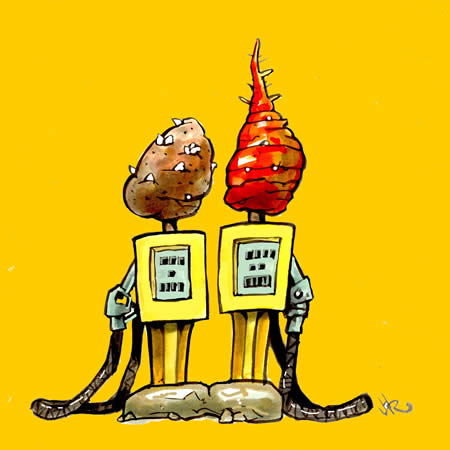Home > Biofuel: a Real Danger to Poor Countries
Edito Europe Agriculture - Fishery - Animals Energy
By Ramine Abadie
Energy. Experts and NGOs are concerned about the perverse effects of this type of production in a world that faces hunger shortages.

While the European Union plans to promote biofuel, experts in food, development, and NGOs are sounding the alarm bell about the risks linked to its production - more particularly the harmful effects on food production. According to FAO (Food and Agriculture Organisation) figures, there are more than 850 million people in the world who face hunger daily.
Jean Ziegler, the Swiss UN Special Rapporteur on the Right to Food tackled the issue about peasants being evicted from the land, due to biofuel production, during the World Food Day of 16 October 2007. He described it a few days later at the UN in New York as no less than a “crime against humanity”, that has been created by … the FAO!
According to Ziegler, the fact that multinational companies make juicy profits and that rich countries fill up their cars in good environmental conscience to the detriment of food production in poor countries amounts to a false move toward easing people’s conscience. “While a child below 10 dies of starvation or of associated illness every five seconds in the world,” he says, “it’s a crime against humanity to devote agricultural land to biofuel production.” According to Ziegler “Rushing to turn food crops (…) into fuel for cars (…) is a recipe for disaster.” This reuse of good agricultural land will make prices of foodstuffs go up, affecting poor people first, estimates the Special Rapporteur, who demands a “five-year moratorium on biofuel production.”
It is all the more urgent to tackle the issue in all its implications, since the European Commission plans to require the members of the EU to use at least 10 % biofuel for transportation by 2020. Such a boom for demand led the NGO Oxfam to react strongly. According to Robert Bailey, Oxfam’s specialist on this issue, “In the scramble to supply the EU and the rest of the world with biofuels, poor people are getting trampled on. It is unacceptable that poor people in developing countries should bear the cost of questionable attempts to cut emissions in Europe.”
The issue could assume more dramatic proportions: some studies show that within twenty years, 5.6 million square kilometres of lands, an area ten times that of France, will be transfered to the production of biofuel in countries such as Brasil, India, South Africa and Indonesia. The UN admits that in such scenarios, at least 60 million farmers in those countries would face eviction from their land, in favour of biofuel production.
Of course, the EU wishes that this 10% of biofuel use could come from production with a context of sustainable development . To Oxfam, this is just a “pious wish”. “Biofuel may offer opportunities for small farmers,” explains the NGO, “[only if] the EU introduces safeguards to protect land rights, livelihoods, workers rights and food security. Instead, a scramble to supply the European market is underway and poor people are getting trampled on.”
ORIGINAL FRENCH ARTICLE :
– Biocarburants : danger pour les pays pauvres
http://www.humaniteinenglish.com/article754.html
Translated Sunday 11 November 2007, by Jonathan Pierrel





Forum posts
18 November 2007, 20:42
INTERNATIONAL ENERGY of Toronto, Canada
(stock symbol: IENI.OB) can make fuel from water and algae.